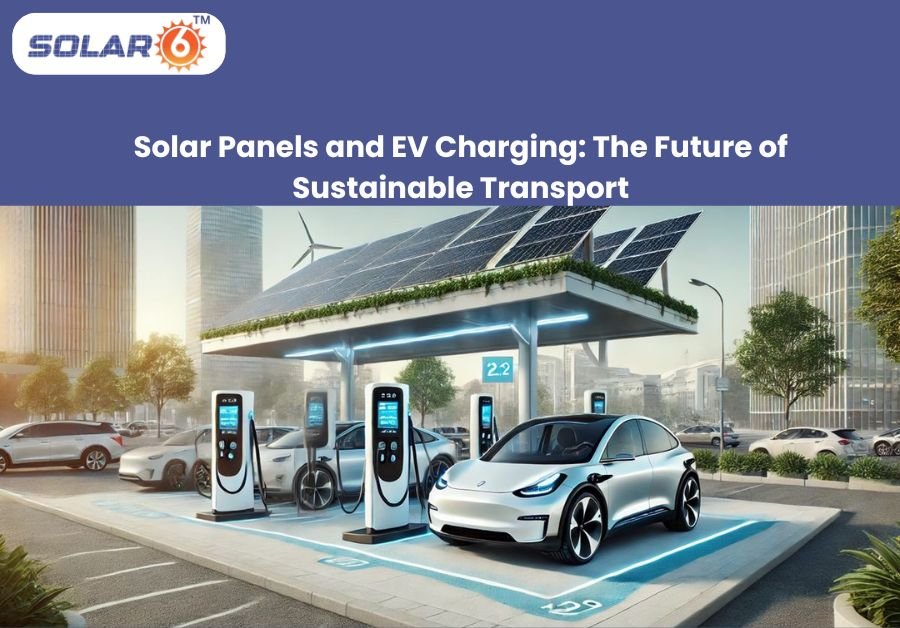The global shift toward clean energy is no longer just a trend; it’s a necessity. Climate change, rising fuel prices, and the urgent need for sustainable transport solutions are pushing both individuals and governments toward innovative energy alternatives. One of the most promising combinations in this green revolution is solar panels paired with electric vehicle (EV) charging systems.
By using solar energy to power EV charging stations, we are paving the way for a transportation system that is truly independent of fossil fuels. Imagine driving your car without worrying about fuel costs or harmful emissions. This is the future that solar-powered EV charging promises.
In this article, Solar6 explores how solar panels and EV charging work together, their benefits, the latest technologies, government incentives, and why they’re key to building a sustainable transport future.
1. The Rise of Electric Vehicles and Clean Energy
Over the past decade, electric vehicles have shifted from niche luxury items to mainstream transportation options. Brands like Tesla, Tata Motors, BYD, Hyundai, and MG have made EVs more accessible, while rising fuel prices have accelerated the demand.
However, the electricity used to charge EVs often still comes from coal-based grids. This means that unless EVs are powered by renewable energy, their environmental benefits are reduced. Solar panels offer the perfect solution for clean, abundant, and sustainable energy to charge vehicles.
2. How Solar Panels Power EV Charging
Solar-powered EV charging works by using photovoltaic (PV) panels to capture sunlight and convert it into electricity. This electricity can be either:
- Used immediately to charge an EV during the day.
- Stored in batteries for nighttime or cloudy-day charging.
- Fed into the grid for net metering benefits.
A rooftop solar setup for a home can be designed to charge a personal EV, while commercial solar charging stations can serve multiple vehicles at once.
3. Benefits of Combining Solar Panels with EV Charging
3.1 100% Renewable and Zero Emissions
Using solar energy eliminates harmful greenhouse gas emissions, making transportation truly green.
3.2 Huge Cost Savings
Fuel costs for petrol or diesel cars can run into thousands of rupees per month. With solar-powered EV charging, you can save up to 70%–90% on charging expenses.
3.3 Energy Independence
No more dependence on fluctuating fuel prices or grid electricity rates, your rooftop solar system can power your EV.
3.4 Low Maintenance and Long Lifespan
Modern solar panels have a lifespan of 25+ years with minimal maintenance, making them a one-time investment with long-term benefits.
3.5 Government Incentives
Many countries, including India, offer solar panel subsidies and EV purchase incentives, making the shift more affordable.
4. Types of Solar-Powered EV Charging Stations
4.1 Grid-Tied Solar EV Charging
Connected to the main power grid, this system uses solar power during the day and draws electricity from the grid when needed.
4.2 Off-Grid Solar EV Charging
Completely independent, this system uses battery storage to supply electricity even when there’s no sunlight.
4.3 Hybrid Solar EV Charging
Combines both grid and battery storage for maximum reliability.
5. Rooftop Solar for Home EV Charging
For homeowners, installing rooftop solar panels is the most practical solution. A 5kW solar system can easily generate enough power to charge most EVs daily while also running household appliances.
Example:
EV Battery: 40 kWh
Solar Output (5kW system): ~20–25 kWh/day
Charging Time: 2 days for a full charge (faster with higher capacity panels).
6. Commercial Solar Charging Stations
Businesses, malls, and highway rest stops can benefit from commercial solar EV charging stations. These stations can accommodate multiple charging points and serve both private and fleet vehicles.
Key benefits for businesses:
- Attract eco-conscious customers.
- Reduce operational costs for delivery fleets.
- Earn through public charging fees.
7. Latest Technology Trends in Solar-Powered EV Charging
Fast Charging with Solar: Integration of high-efficiency solar panels and DC fast chargers to reduce charging time.
Bifacial Solar Panels: Capture sunlight from both sides for higher efficiency.
Solar Carports: Parking structures with solar panels on the roof, combining shade and charging.
Smart EV Chargers: Mobile app integration for monitoring charging and solar output.
Vehicle-to-Grid (V2G) Technology: Allows EVs to feed stored energy back to the grid.
8. Government Support and Subsidies in India
PM Surya Ghar Muft Bijli Yojana: Subsidies for rooftop solar panel installation.
GST reduced on EVs and chargers.
State-level incentives for both solar panels and EV purchases.
Global Examples
USA: Federal tax credits for solar installation and EVs.
EU: Grants and feed-in tariffs for renewable energy projects.
9. Challenges in Solar-Powered EV Charging
High Initial Cost: Despite falling solar panel prices, battery storage and fast chargers can be expensive.
Space Requirement: Large-scale stations need adequate sunlight exposure.
Weather Dependence: Solar output varies based on sunlight availability.
10. The Future of Solar and EV Charging
By 2030, experts predict that renewable sources, primarily solar energy, will power most EV charging stations. With advancements in battery storage, charging speeds, and panel efficiency, solar-powered EV charging will become the norm rather than the exception.
The combination of solar panels and EVs is more than just a technological advancement; it’s a movement toward a cleaner, greener, and more sustainable future.
Conclusion
The world is moving toward sustainable transport, and solar-powered EV charging stands at the forefront of this transition. It offers a unique combination of zero emissions, lower costs, and energy independence. With government subsidies, technological innovation, and growing consumer awareness, the adoption of solar panels for EV charging is set to accelerate in the coming years.
If you own an EV or plan to buy one soon, pairing it with a rooftop solar system from Solar6 is the smartest investment you can make, not just for your wallet, but for the planet.

